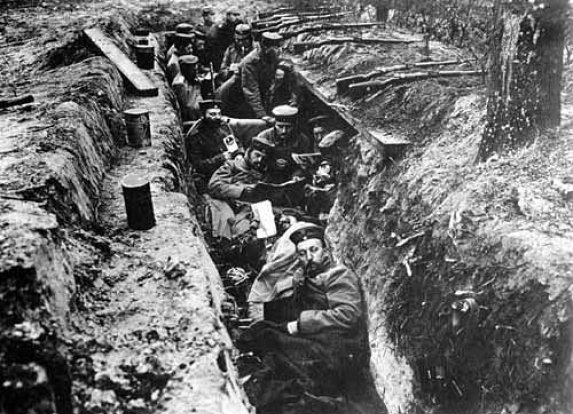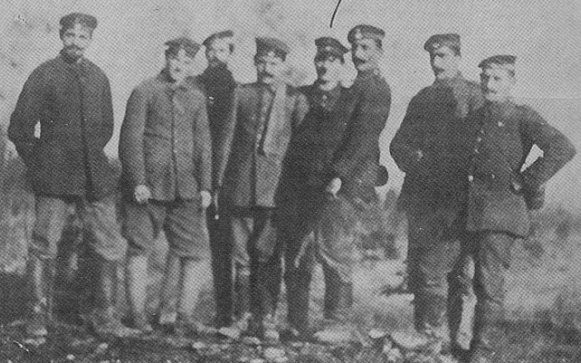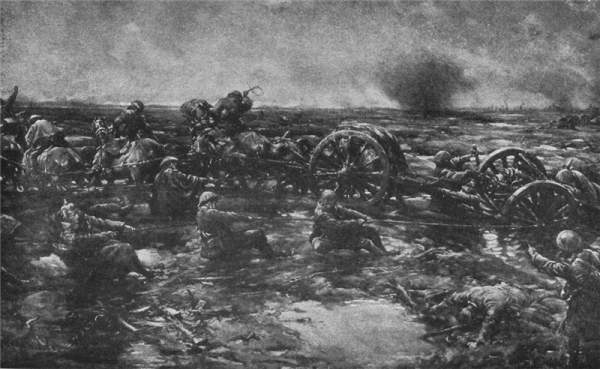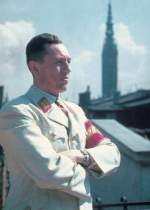
Aug 24

1814 The British 85th Light Infantry uses rockets against an American rifle battalion during the Battle of Bladensburg. An eye-witness, British Lieutenant George R. Gleig, records: "Never did men with arms in their hands make better use of their legs." (Civilization, Glover)
[See: Wunderwaffen: Hitler's Deception and the History of Rocketry.]1914 World War I: Various
Eastern front: Samsonov's troops encounter the Germans near Frankenau, and severe fighting rages the entire day, between Frankenau and Tannenburg.
Western front: The Guns of August intensify, as the main German armies enter France. After four days of furious fighting, the devastated French fall back in the Ardennes and reorganize west of the Meuse.
As they crossed the Belgium frontier into France, the German armies were engaged by seven French armies, and four British divisions known as the British Expeditionary Force (BEF). The French were laboring under the delusion that Gallic élan and derring-do would prove decisive in countering any action the Germans might mount against them. The French High Command had made little plans for dealing with such a large massed attack quickly bearing down on them. It was only through the actions of one corps commander who (without permission from Joffre who repeatedly ignored his frantic pleas) withdrew his forces from certain envelopment and redeployed them from a more tenable position that the entire French line was saved from complete collapse.

1915 World War I: List Regiment: Gefreiter Adolf Hitler's 16 Reserve Infantry Regiment continue to occupy a position at Fromelles, on a level field with water channels, willow trees and willow stalks; in the distance towards the enemy lines lies an insignificant wood with barbed wire entanglements. Under the direction of their defense-minded commander, Lieutenant General Gustav Scanzoni von Lichtenfels, the regiment works ceaselessly day and night to further fortify their position at Fromelles while fighting off repeated assaults by the enemy. [For further details, Click here.]

Hitler and his fellow dispatch runners
1916 World War I: Various:
List Regiment: Gefreiter Adolf Hitler endures trench warfare in Flanders (Artois) with 3 Company, 16 Reserve Infantry Regiment [List Regiment]. [For further details, Click here.]
Eight people are killed when Zeppelins raid the outskirts of London:
While the Germans had the capability to bomb Britain using Zeppelins from the start of the war, the Kaiser had banned this since he considered Britain as another "Christian nation" and viewed the bombing of civilians as less than gentlemanly.

1917 World War I: List Regiment (July 22-September 8): Dispatch Runner Gefreiter Adolf Hitler serves at the front with 3 Company, 16 Bavarian Reserve Infantry Regiment during Phase 2 operations in Flanders. Most of their time in the trenches gas masks are worn, while English bombers attack from the air, and tanks attempt to advance over a long front through seas of mud. [For further details, Click here.]
1918 World War I: List Regiment (August 21-25): Gefreiter Adolf Hitler attends a signals training course in Nuremberg. [For further details, Click here.]
1921 US Peace Treaty with Austria:
That the state of war declared to exist between the Imperial and Royal Austro-Hungarian Government and the United States of America by the joint resolution of Congress approved December 7, 1917, is hereby declared at an end. "SEC. 4. That in making this declaration, and as a part of it, there are expressly reserved to the United States of America and its nationals any and all rights, privileges, indemnities, reparations or advantages, together with the right to enforce the same, to which it or they have become entitled under the terms of the armistice.
[See: Austria: The Other Germany.]1933 Nazi Germany: The Nazis prohibit the German-Jewish Maccabee team from participating in the World Maccabee games, an international Jewish athletic event similar to the Olympics.
Ironically, Judas Maccabeus, the man for whom the games are named, strongly disapproved of athletic games and competitions, which were a clear influence of Greek culture and were introduced into Jerusalem by his staunch enemies the Hellenising Jews, and abolished upon his getting control of the city. These games are modelled on the modern Olympics, in turn modeled on the Classical Greek ones, of which Maccabeus also evidently disapproved as part of an alien and hostile culture.
1936 Two-year mandatory military service becomes compulsory in Germany:
For two years, the German military expanded in secret. By March 1935, Hitler felt strong enough to go public on Nazi Germany's military expansion - which broke the terms of the Versailles Treaty. Europe learned that the Nazis had 2,500 war planes in its Luftwaffe and an army of 300,000 men in its Wehrmacht. Hitler felt confident enough to publicly announce that there would be compulsory military conscription in Nazi Germany and that the army would be increased to 550,000 men.
How did Europe react to this flagrant violation of Versailles?
Essentially, the French and British did nothing. Britain was still recovering from the Depression which had devastated her economy. She could not afford a conflict. The French preferred a defensive policy against a potential German threat and she spent time and money building the vast Maginot Line—a series of vast forts on the French and German border. The most Britain, France and Italy did (at this time, Italy did not view German as a potential ally as the above was pre-Abyssinia) was to form the Stresa Front which issued a protest against Hitler's rearmament policy but did nothing else.
1936 Death: Lev Kamenev—executed after being found guilty of treason in the first Stalinist 'show trial' of the Great Purge:
Kamenev, together with Zinoviev and Trotsky, organized and guided this conspiracy. My motives? I had become convinced that the party's—Stalin's policy—was successful and victorious. We, the opposition, had banked on a split in the party; but this hope proved groundless. We could no longer count on any serious domestic difficulties to allow us to overthrow Stalin's leadership. We were actuated by boundless hatred and by lust of power[sic].
1939 Countdown to war:
Poland and Great Britain formally sign a treaty of mutual assistance.
Britain: Parliament reconvenes and passes the Emergency Powers Act. Royal Assent is given on the same day, and the Royal Navy is ordered to war stations. Soon afterward a general mobilization begins.
Speech by the British Prime Minister in the House of Commons:
The measures that we have taken up to now are of a precautionary and defensive character, and to give effect to our determination to put this country in a state of preparedness to meet any emergency, but I wish emphatically to repudiate any suggestion, if such a suggestion should be made, that these measures imply an act of menace. Nothing that we have done or that we propose to do menaces the legitimate interests of Germany. It is not an act of menace to prepare to help friends to defend themselves against force. If neighbors wishing to live together peacefully in friendly relations find that one of them is contemplating apparently an aggressive act of force against another of them, and is making open preparations for action, it is not a menace for the others to announce their intention of aiding the one who is the subject of this threat.
[See: What Were Adolf Hitler's Major Blunders?]

Hitler predicts the Chamberlain government will fall.
President Roosevelt telegrams the President of Poland:

It is, I think, well known to you that, speaking on behalf of the United States, I have exerted, and will continue to exert, every influence on behalf of peace. The rank and file of the population of every nation-large and small-want peace. They do not seek military conquest. They recognise that disputes, claims and counter-claims will always arise from time to time between nations, but that all such controversies, without exception, can be solved by a peaceful procedure, if the will on both sides exists so to do.
Birger Dahlerus—a Swedish businessman and amateur diplomat, authorized by no government, meets with Hermann Goering, who proposes that Dahlerus should act as a go-between with Great Britain.
[See: Was Adolf Hitler 'Forced' Into the War?]Sir H. Kennard to Viscount Halifax:
The Minister for Foreign Affairs informs me that Polish Ambassador in Berlin had an interview with Field-Marshal Goering this afternoon. The interview was most cordial and he told me the Marshal expressed his regret that his policy of maintaining friendly relations with Poland should have come to naught and admitted that he no longer had influence to do much in the matter. The Marshal had, however, no concrete suggestion to make beyond what had struck M. Beck as a most significant remark which he requested me to convey to you most confidentially. The Marshal stated that the question of Danzig and so forth were relatively small matters, but the main obstacle to any diminution of the tension between the two countries was Poland's alliance with Great Britain.
President Roosevelt appeals for settlement of the Danzig crisis by mediation in a telegram to Hitler:
The people of the United States are as one in their opposition to policies of military conquest and domination. They are as one in rejecting the thesis that any ruler, or any people, possess the right (to) achieve their ends or objectives through the taking of action which will plunge countless millions of people into war and which will bring distress and suffering to every nation of the world, belligerent and neutral, when such ends and objectives, so far as they are just and reasonable, can be satisfied through processes of peaceful negotiation or by resort to judicial arbitration. I appeal to you in the name of the people of the United States, and I believe in the name of peace-loving men and women everywhere, to agree to the solution of the controversies existing between your Government and that of Poland.
Nazi Gauleiter Albert Foerster becomes head of state in Danzig:

Following Poland's defeat, while Greiser became Gauleiter of the region of north-western Poland annexed to Germany after 1939, the Warthegau, Forster became the Gauleiter and Reichstatthalter (governor) of the province Danzig-West Prussia from 1939-1945, thereby concentrating both the State and Nazi Party power in his hands. Adolf Hitler instructed the Gauleiters, namely Forster and his rival Arthur Greiser, in the Warthegau to 'Germanize' the area, promising that "There would be no questions asked" about how this "Germanization" was to be accomplished.

Pope Pius XII appeals for peace—giving each papal representative the text of a speech asking them to convey it to their respective governments. That evening he read the speech to the world:
The danger is imminent, but there is still time. Nothing is lost with peace; all can be lost with war. Let men return to mutual understanding! Let them begin negotiations anew, conferring with good will and with respect for reciprocal rights.
1940 World War II: War in the Air (August 24-29): British bombing raids on the civilian population of Berlin cause negligible damage and slight loss of life in the German capital, but the loss of face greatly angers and embarrasses Hitler. (THP)
The Luftwaffe begins attacking further inland—seeking to destroy RAF bases and production centers.
In order to vector the defending fighters on to an incoming raid, the controller had to know exactly where they were. The last link in the defence system, keeping track of the RAF fighters, were Direction-Finding or D/F radio stations. These also reported to their local Sector Control Room, and so up the chain of command in the same way as the Observer Corps. Again, this information was transmitted to every sector to keep the "Big Picture" spread throughout the command system. By doing this, the loss of a single Sector Control Room did not destroy Fighter Command's ability to function as an effective defense. The Direction Finding stations provided the last link by tracking friendly fighters and reporting to the entire chain. This control system is the source of many of the terms still used in air traffic control today. [For further details, Click here.]
[See: Why Did Hitler Lose The Battle of Britain?]1941 Holocaust: In a broadcast to the British people, Churchill, referring to the mass murders committed by the Germans, states: "We are in the presence of a crime without a name.
But all this did not satiate Adolf Hitler. He made a treaty of non-aggression with Soviet Russia, just as he made one with Turkey, in order to keep them quiet until he was ready to attack them. And then, nine weeks ago today, without a vestige of provocation, he hurled millions of soldiers with all their apparatus upon the neighbour he had called his friend with the avowed object of destroying Russia and tearing her in pieces.
This frightful business is now unfolding day by day before our eyes. Here is a devil who, in a mere spasm of his pride and lust for domination, can condemn two or three millions, perhaps it may be many more, of human beings to speedy and violent death. Let Russia be blotted out. Let Russia be destroyed. Order the armies to advance. Such were his decrees. Accordingly, from the Arctic Ocean to the Black Sea, six or seven millions of soldiers are locked in mortal struggle.
1942 World War II: Various:
Battle of the Eastern Solomons: In the third carrier-versus-carrier battle of the war, US naval forces defeat a Japanese force attempting to screen reinforcements for the Guadalcanal fighting. This Second Naval Battle of Guadalcanal spells the difference between victory and defeat for the United States in the Pacific war.
From a cabinet meeting of the Government-General: Hans Frank:

Before the German people suffer starvation, the occupied territories and their people shall be exposed to starvation. In this moment, therefore, we here in the Government General must have the iron determination to help the great German people, that is our fatherland. The Government General, therefore, must do the following: The Government General has undertaken to send 500,000 tons of bread grain to the fatherland in addition to the foodstuffs already being delivered for the relief of Germany or consumed here by troops of the Armed Forces, Police, or SS. If you compare this with our contributions of last year you can see that this means a six-fold increase over that of last year's contribution by the Government General. The new demand will be fulfilled exclusively at the expense of the foreign population. It must be done cold-bloodedly and without pity . . . . With all the difficulties which arise from the illness of workers, or the breaking down of your co-operatives, you must always bear in mind that it is much better if a Pole collapses than if the Germans are defeated. The fact that we shall be condemning 1,200,000 Jews to death by starvation should be mentioned incidentally. Of course, if the Jews do not die from starvation, it is to be hoped that anti-Jewish measures will be expedited in the future."
1943 World War II: Poles in London propose a 'massive liberation of prisoners from Auschwitz' but fail to persuade the Allies to bomb Auschwitz during raids on German factories in Silesia.
1944 World War II: Various:

Horia Sima (now in Germany) begins the formation of a Romanian National Army composed of all Romanian volunteers then in Germany and those who could escape and join them.
FDR to Churchill:
Stalin's reply to our joint proposal for assisting the Warsaw Poles is far from encouraging. The supply of the Warsaw Poles is, I am informed, impossible unless we are permitted to land and take off from Soviet airfields. Their use for the relief of Warsaw is at present prohibited by the Russian authorities. I do not see what further steps we can take at the present time that promise results.
1954 Congress passes Communist Control Act in response to the growing anticommunist hysteria in the United States. Though full of ominous language, many found the purpose of the act unclear. [For further details, Click here.]
1956 Spandau Prison: From Spandau: The Secret Diaries, by Albert Speer:
Schirach's only reaction to a picture of Neurath's funeral in Die Welt: "Did you see Papen's morning coat? Perfect fit; he must have a first-class tailor. Probably done by Knize in Vienna." (Speer II)
1961 Former Nazi supporter Johannes Vorster becomes South Africa's Minister of Justice:
In Vorster's younger years, he attracted notoriety by opposing South Africa's intervention on the side of the Allies in World War II, and speaking favorably of the Nazi regime of Adolf Hitler, whose dictatorial government he regarded as a better model for South Africa than the Westminster parliamentary (cabinet) system. He rose to the rank of General in the paramilitary wing of the Ossewabrandwag. In 1942 he was interned for his Nazi sympathies and ties with the paramilitary. Following his release, Vorster became active in the National Party.
1979 Death: Hanna Reitsch—the most famous German test pilot. In the last days of the war Reitsch was asked to fly her companion, Colonel-General Robert Ritter von Greim, into Berlin to meet with Hitler. The city was already surrounded by Red Army troops who had made significant progress into the downtown area when they arrived on the 27th April, landing on a city street, and travelled to the Fuehrerbunker. The aircraft she used was the justly famous Fieseler Storch already well known for the exploit that rescued Mussolini (see Otto Skorzeny for information about Mussolini's rescue), only adding to the legend of both Reitsch and that aircraft. She is said to have overheard Hitler laying out plans for Nazi commanders to join together in mass suicide when it was obvious that the war was over. She also hoped to fly out propaganda minister Joseph Goebbels' six children, who had been staying in the bunker since April 22 with their parents, but neither Joseph nor Magda Goebbels would allow it. She escaped Berlin on 29th April by flying out through heavy Russian anti-aircraft fire. She was a devoted and idealistic Nazi, who adored Adolf Hitler and refused to believe the reports of concentration camps and torture. Not until much later would she say that she had been "disgusted" by what she witnessed in the Third Reich. She was held for 18 months by the American military after the war, she was interrogated and subsequently released.
Edited by Levi Bookin (Copy editor)
levi.bookin@gmail.com



Click to join 3rdReichStudies



Disclaimer: This site includes diverse and controversial materials—such as excerpts from the writings of racists and anti-Semites—so that its readers can learn the nature and extent of hate and anti-Semitic discourse. It is our sincere belief that only the informed citizen can prevail over the ignorance of Racialist "thought." Far from approving these writings, this site condemns racism in all of its forms and manifestations.
Fair Use Notice: This site may contain copyrighted material the use of which has not always been specifically authorized by the copyright owner. We are making such material available in our efforts to advance understanding of historical, political, human rights, economic, democracy, scientific, environmental, and social justice issues, etc. We believe this constitutes a "fair use" of any such copyrighted material as provided for in section 107 of the US Copyright Law. In accordance with Title 17 U.S.C. Section 107, the material on this site is distributed without profit to those who have expressed a prior interest in receiving the included information for research and educational purposes. If you wish to use copyrighted material from this site for purposes of your own that go beyond 'fair use', you must obtain permission from the copyright owner.
Please Note: The list-owner and moderators of 3rdReichStudies are not responsible for, and do not necessarily approve of, the random ads placed on our pages by our web server. They are, unfortunately, the price one pays for a 'free' website.